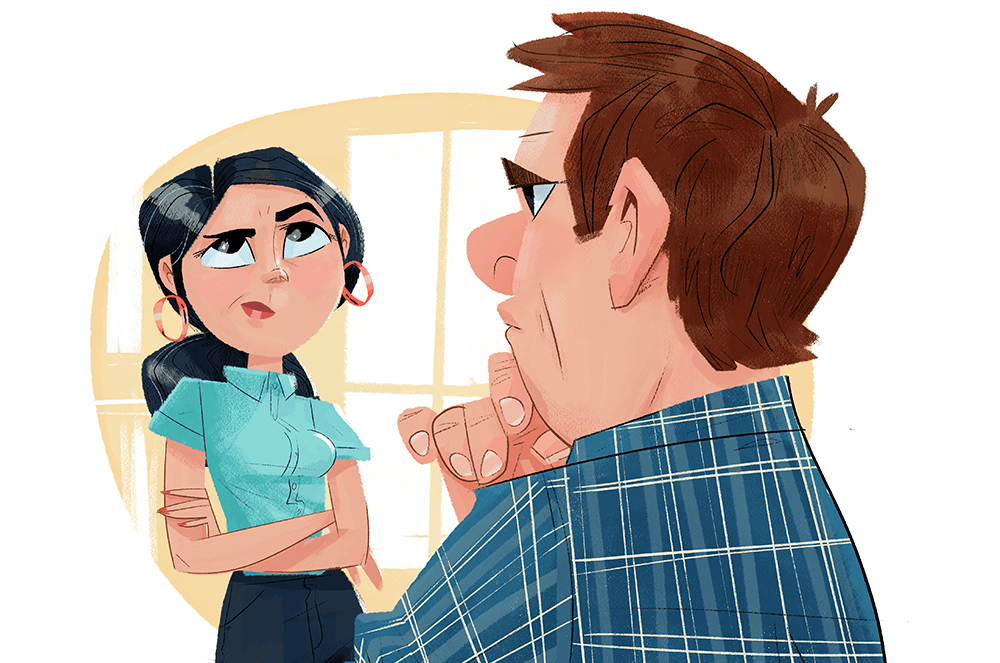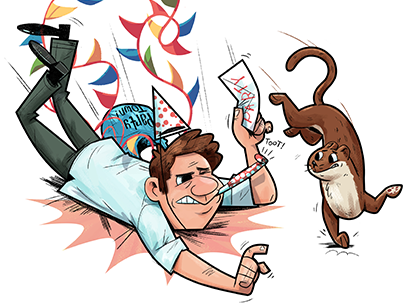
As a darkening sky foretells inclement weather, so do certain words and phrases signal the arrival of unpleasant news. It seems if there is something we have to say that will not be well received, we like to give fair warning, however brief, before lowering the boom.
For instance, when someone begins with the word “Unfortunately,” you know what’s coming next can’t be good. Unfortunately, the ship is leaving in five minutes, and I don’t see any reservation in your name for the 50th anniversary cruise you booked five months ago at the cost of 10,000. Sorry.
Or, “Listen, the reason I’m calling …” This is usually prefaced by some small talk from a person who never calls you for small talk, like your stockbroker. Hey, how you doing? How are the kids? Getting out to the golf course much? Great! Listen, the reason I’m calling … Does he or she really have to go on? Clearly, you’ve just lost some money. Better to end the call right there than stick around to find out how much.
“Do you know how fast you were going?” We all know that one. With a seemingly innocent question, the state trooper has said it all: I don’t care what you say because I know you were speeding, so here’s your ticket, which will cost you money, put points on your license, and make you call your lawyer to see if you can get out of it, which will cost you even more. Have a nice day.
Then there’s that moment in the workplace when the boss calls you into his or her office and says, “Close the door”—three little monosyllables that can really be translated into two: You’re toast. You might be lightly toasted or burnt to a crisp, but when you hear “Close the door,” you know your bread is buttered on the side that hits the floor.
We all know when someone says, “Can I ask you a question?,” this is the equivalent of a loaded cannon pointed straight at you.
If you’re British and someone initiates a conversation with “I’m not being funny, but …,” you can bet it’s not going to be funny—in fact, quite the opposite. The British use this idiom when they want to convey something serious or sensitive: I’m not being funny, but your father’s will clearly stipulates that you inherit what you always said you loved most—his dog—while your sister gets 14 million pounds because—and I quote–“it’s only money,” which is apparently what you said when you were spending his. I’m sorry, is there a problem? Talk about not funny.
The American equivalent to the above is “I hate to say this but …” Not only does the phrase presage bad news, it is the height of disingenuousness, since what it really means is: I am happy to say this because you’re in trouble, not me.
I also have advice when someone says, “Can I ask you a question?” We all know this is the equivalent of a loaded cannon pointed straight at you. So why not simply say, “No, you can’t ask me a question.” It may be rude but it’s better than getting hit with a “question” designed to lower your defenses so they can pound you with a jackhammer: Can I ask you a question? Your last three performance reviews have all mentioned how snapping your gum annoys the people around you, yet you continue to do it. Are you that spectacularly insensitive or just utterly clueless?
This same outcome may arise from a different phrase: “Because I was just wondering …” This occurs when “Can I ask you a question …” doesn’t get the desired response, when you don’t admit or even acknowledge your guilt. This frustrates the questioner to no end because you have already been arrested, tried, and convicted in the court of this person’s mind and they won’t stop until they get a confession: Because I was just wondering … if, as you say, you are still not aware of your gum-snapping problem after three performance reviews, I’m going to delete “insensitive” and “clueless” and go right to “stupid.” HR will set up a time for you to watch the video “The Importance of Being a Team Player.”
On a personal note, when my wife calls me “John,” I know I’m in trouble. Usually, it’s “honey” or “sweetheart,” but when it’s “John,” it’s like a jury saying “guilty on all counts”—of what, I don’t know, but I do know with the certainty of death and taxes that I’m about to find out.
John Cadley is a former advertising copywriter, freelance writer, and musician living in Fayetteville, New York. Learn more at www.cadleys.com.



 Previous
Previous

 Previous Article
Previous Article

